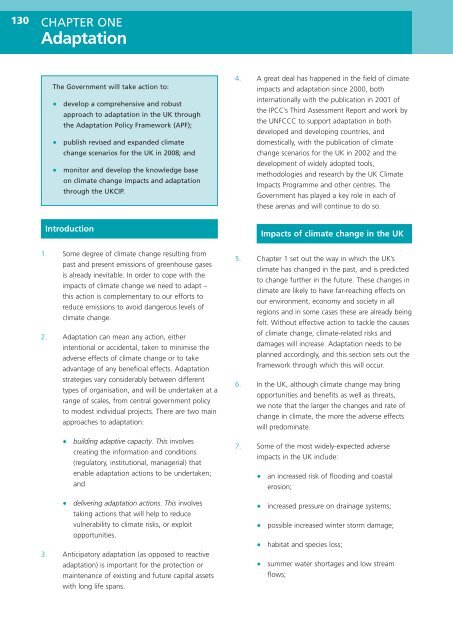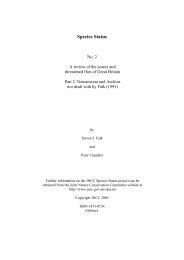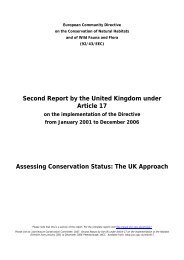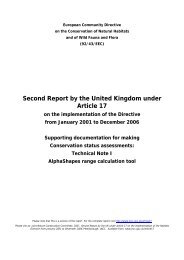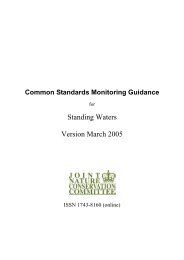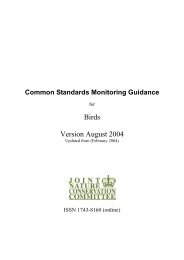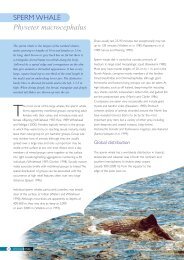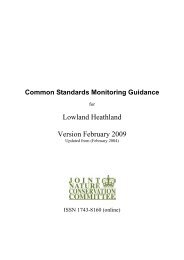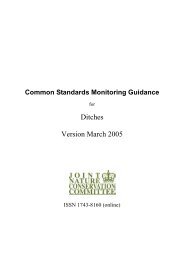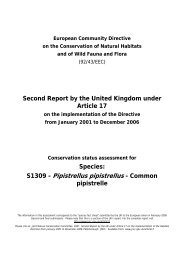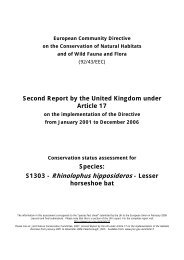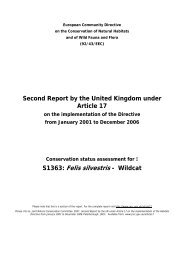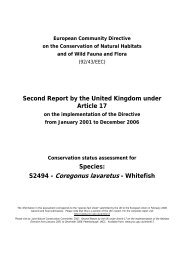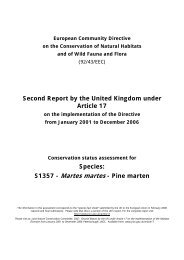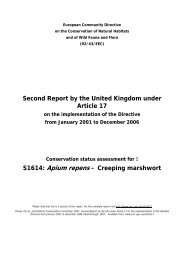UK Climate Change Programme 2006 - JNCC - Defra
UK Climate Change Programme 2006 - JNCC - Defra
UK Climate Change Programme 2006 - JNCC - Defra
You also want an ePaper? Increase the reach of your titles
YUMPU automatically turns print PDFs into web optimized ePapers that Google loves.
130<br />
CHAPTER ONE<br />
Adaptation<br />
The Government will take action to:<br />
• develop a comprehensive and robust<br />
approach to adaptation in the <strong>UK</strong> through<br />
the Adaptation Policy Framework (APF);<br />
• publish revised and expanded climate<br />
change scenarios for the <strong>UK</strong> in 2008; and<br />
• monitor and develop the knowledge base<br />
on climate change impacts and adaptation<br />
through the <strong>UK</strong>CIP.<br />
4. A great deal has happened in the field of climate<br />
impacts and adaptation since 2000, both<br />
internationally with the publication in 2001 of<br />
the IPCC’s Third Assessment Report and work by<br />
the UNFCCC to support adaptation in both<br />
developed and developing countries, and<br />
domestically, with the publication of climate<br />
change scenarios for the <strong>UK</strong> in 2002 and the<br />
development of widely adopted tools,<br />
methodologies and research by the <strong>UK</strong> <strong>Climate</strong><br />
Impacts <strong>Programme</strong> and other centres. The<br />
Government has played a key role in each of<br />
these arenas and will continue to do so.<br />
Introduction<br />
Impacts of climate change in the <strong>UK</strong><br />
1. Some degree of climate change resulting from<br />
past and present emissions of greenhouse gases<br />
is already inevitable. In order to cope with the<br />
impacts of climate change we need to adapt –<br />
this action is complementary to our efforts to<br />
reduce emissions to avoid dangerous levels of<br />
climate change.<br />
2. Adaptation can mean any action, either<br />
intentional or accidental, taken to minimise the<br />
adverse effects of climate change or to take<br />
advantage of any beneficial effects. Adaptation<br />
strategies vary considerably between different<br />
types of organisation, and will be undertaken at a<br />
range of scales, from central government policy<br />
to modest individual projects. There are two main<br />
approaches to adaptation:<br />
• building adaptive capacity. This involves<br />
creating the information and conditions<br />
(regulatory, institutional, managerial) that<br />
enable adaptation actions to be undertaken;<br />
and<br />
• delivering adaptation actions. This involves<br />
taking actions that will help to reduce<br />
vulnerability to climate risks, or exploit<br />
opportunities.<br />
3. Anticipatory adaptation (as opposed to reactive<br />
adaptation) is important for the protection or<br />
maintenance of existing and future capital assets<br />
with long life spans.<br />
5. Chapter 1 set out the way in which the <strong>UK</strong>’s<br />
climate has changed in the past, and is predicted<br />
to change further in the future. These changes in<br />
climate are likely to have far-reaching effects on<br />
our environment, economy and society in all<br />
regions and in some cases these are already being<br />
felt. Without effective action to tackle the causes<br />
of climate change, climate-related risks and<br />
damages will increase. Adaptation needs to be<br />
planned accordingly, and this section sets out the<br />
framework through which this will occur.<br />
6. In the <strong>UK</strong>, although climate change may bring<br />
opportunities and benefits as well as threats,<br />
we note that the larger the changes and rate of<br />
change in climate, the more the adverse effects<br />
will predominate.<br />
7. Some of the most widely-expected adverse<br />
impacts in the <strong>UK</strong> include:<br />
• an increased risk of flooding and coastal<br />
erosion;<br />
• increased pressure on drainage systems;<br />
• possible increased winter storm damage;<br />
• habitat and species loss;<br />
• summer water shortages and low stream<br />
flows;


